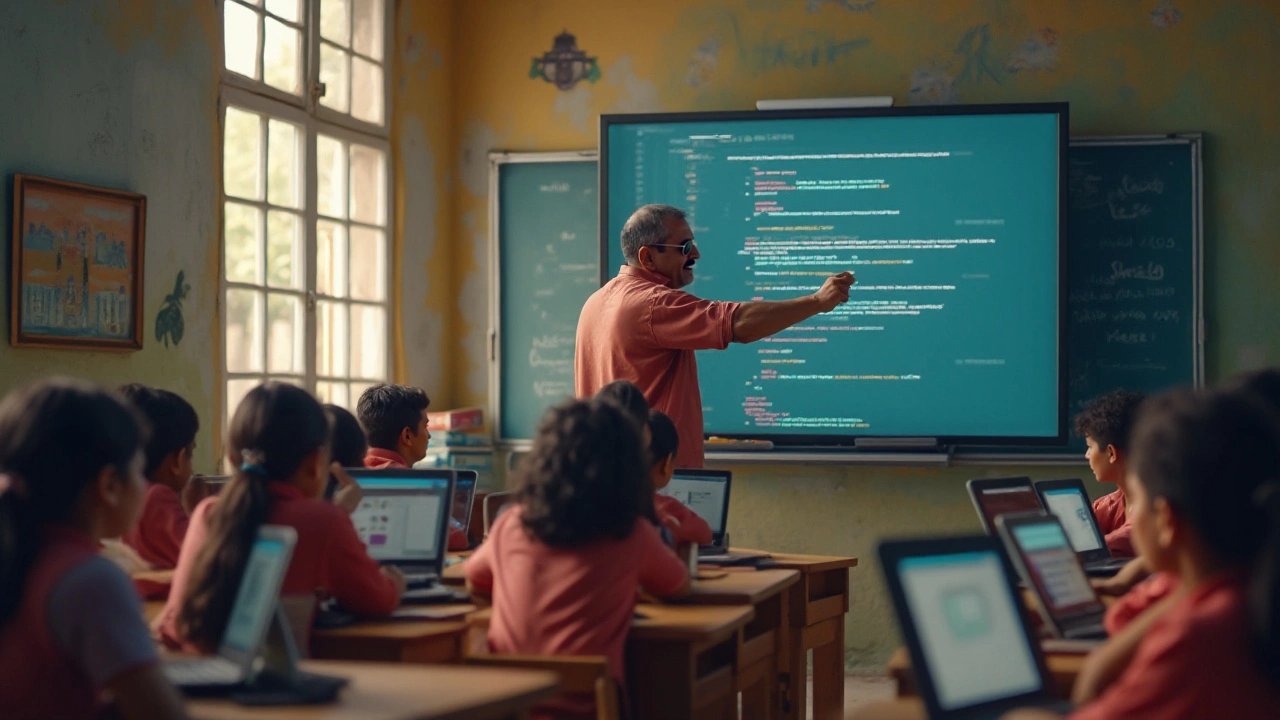Diving into the world of coding can feel like stepping onto a new planet for many beginners. Questions fill the mind; is this journey going to be incredibly difficult, or just a new challenge waiting to be conquered? The perception of coding's difficulty often differs from one person to another. While it may seem daunting at first, with a little guidance and a positive mindset, it can transform into a fulfilling and manageable pursuit.
Many budding coders encounter a series of common issues: wrapping their heads around new concepts, finding solutions to seemingly complex problems, and dealing with occasional frustration when something doesn't work the first time. Yet, beneath these roadblocks lies an opportunity for growth and development. Coding offers a unique blend of logic and creativity once understood.
For those just starting, the key lies in persistence and seeking out resources that resonate with them. The internet is abundant with tutorials, coding classes, and communities ready to lend a helping hand. Envision this learning curve as part of the adventure - full of discoveries that will gradually nurture confidence and capability.
So, is coding hard for beginners? It truly depends on one's approach and attitude. With a bit of patience, excitement for learning, and a willingness to overcome challenges, coding can become less of a mystery and more of a creative outlet. Engage with the process, appreciate each small victory, and let every piece of code written bring you closer to mastering the art of programming.
- The Perception of Coding Difficulty
- Common Challenges New Coders Face
- Effective Tips for Aspiring Coders
- Embracing the Coding Journey
The Perception of Coding Difficulty
Coding is like learning a new language, but instead of speaking it, you tell machines what to do. For the uninitiated, this often conjures up images of complex math, endless lines of text, and mysterious symbols. However, these images are often misleading, fueled by pop culture and the tech industry's aura of exclusivity. Beginners may see coding as an insurmountable challenge, especially when they're bombarded with terms like algorithms or databases, yet the reality is far more accessible. Like any language, coding requires practice, patience, and a little bit of curiosity. The good news is that once you get past the initial hurdle, the entire process becomes a lot clearer and surprisingly fun.
Many people don't realize that coding is not so much about rote memorization as it is about problem-solving and logic. In fact, several studies suggest that anyone can learn to code, irrespective of their mathematical prowess. For instance, a Harvard Business Review article suggests that the most successful coders are often those who approach problems creatively and persistently. This interesting insight flips the script for the beginner, reinforcing that the difficulty is often a mental barrier rather than an insurmountable skill gap. Understandably, it requires one to step out of their comfort zone, but that's a typical part of any form of learning.
For beginners, the hardest part may be knowing where to start. Programming languages abound—Python, JavaScript, Ruby, and each carries its own set of functions suitable for different tasks. For many, Python emerges as a beginner-friendly choice. Its syntax is readable and succinct, offering new coders a gentle on-ramp into the world of programming. This simplicity does not detract from its power, as Python is used by tech giants like Google and Netflix, as well as for critical tasks in data science and machine learning. Recognizing this helps to alleviate some of the anxiety beginners feel, equipping them with perspective on what's achievable.
"Most programmers learn by doing, and learning some fundamentals can make a roadmap of learning," says Tim O'Reilly, a founder of O'Reilly Media, which has published countless coding books for every level.
Data from Stack Overflow's annual developer survey highlight an interesting trend: nearly a third of those surveyed had only been coding for less than five years, underscoring coding’s increasing accessibility. The rise of online coding classes and bootcamps also reflects this trend, lowering the entry barriers for a much wider audience. If you’re worried about getting started, know this isn't a leap into the unknown—it’s a step into a vibrant community ready to support and nurture new arrivals. Whether you aspire to become a full-time developer or just want to know the ropes to enhance your career, coding communities house resources, forums, and mentors who can expedite your learning journey. Remember, every seasoned coder started where you are today, and that shared experience fosters a strong sense of inclusivity in the world of coding.

Common Challenges New Coders Face
Embarking on the journey to learn coding can sometimes feel like navigating uncharted waters, with a myriad of challenges that new coders regularly encounter. Among the initial hurdles is understanding the syntax of a programming language. For instance, missing a semicolon in languages like JavaScript can lead to unexpected errors that baffle beginners. It often feels like learning a new language, where every small detail matters, and overlooking them might cause a program to fail. Moreover, understanding how code translates to interactive function requires not just reading but thinking critically about how different pieces of code interact.
Another common challenge is the sheer volume of information to digest. When learners first step into the realm of coding classes, they are often bombarded with different programming languages such as Python, Java, or Ruby. Each has its unique features and use cases. Beginners might struggle to discern which language to focus on first, potentially causing analysis paralysis. Exposure to so many options can overwhelm even the most eager students. Therefore, understanding the right pathway and having a structured learning plan is crucial to making initial progress.
Problem-solving is another significant aspect that poses challenges for new coders. Coding is inherently about solving problems, and beginners often find themselves perplexed by logical puzzles and errors that demand intricate solutions. Errors that show up in their code can seem cryptic and frustrating, requiring a shift from traditional learning methods to a more solution-based approach. For example, debugging—a necessary evil—is an area where beginners must learn the art of patience. They often wish to wave a magic wand and have it all work seamlessly, yet persistence and analytical thinking are the real tools of the trade.
In the emotional realm, beginners frequently face self-doubt. Imposter syndrome is rampant among novice programmers as they compare their fledgling skill sets against seasoned professionals. This feeling can be disheartening, leading them to question their capabilities. The discomfort of feeling like a beginner is something many find hard to shake off. But as renowned educator and programmer Mitchel Resnick once said,
“The key point is to recognize that there is a path through coding learning, and every coder has traveled this path.”Such encouragement underlines the importance of viewing challenges as stepping stones rather than stumbling blocks.
Time management is another hidden obstacle. Many learners struggle to find the balance between rigorous practice and their daily responsibilities. Balancing between practicing and absorbing new concepts while managing work, school, or family obligations can cause stress and burnout if not managed properly. It's essential for beginners to set realistic goals and prioritize their learning time efficiently. While a passion for coding draws them in, managing the intensity of learning is crucial for sustained progress.
The reality is that beginner programming hinges on navigating these obstacles with a strategic, flexible mindset. Embracing a growth mentality is crucial. Understanding that mistakes are integral to the learning process and persisting even when the going gets tough lays the groundwork for a successful coding journey. By incorporating feedback and learning from peers and mentors, new coders can steadily climb the learning curve and find mastery and joy in coding.

Effective Tips for Aspiring Coders
Embracing the world of coding requires more than just determination; it involves adopting practical strategies to ease the learning process. As you embark on this exciting journey, remember that everyone, even the most skilled programmers, started as an eager beginner. To navigate the challenges and accelerate your progress, let's explore some effective tips.
Firstly, setting realistic goals is crucial. The coding universe is vast, and it’s easy to get overwhelmed by its complexities. To manage this, break down your learning into smaller, digestible milestones. Create a schedule that includes daily or weekly targets, allowing for incremental achievements that will build confidence over time. By doing so, you foster a habit of consistent practice, turning coding for starters into a rewarding routine. Start with easy programming languages like Python or JavaScript, which are known for their beginner-friendly syntax and wide usage in various applications.
Leveraging available resources is another powerful step. The digital landscape is rich with free tutorials, blogs, podcasts, and coding classes tailored to cater to different learning styles. Platforms such as Codecademy, Coursera, and freeCodeCamp offer comprehensive courses that span from beginner levels to more advanced concepts. Engage with coding communities on forums like GitHub and Reddit, where seasoned developers share valuable insights and feedback on your code. This community interaction can prove to be an invaluable asset, offering support and encouragement when you encounter stumbling blocks.
“Learning to write programs stretches your mind and helps you think better,” noted Bill Gates, emphasizing the cognitive benefits coding offers beyond technical skill acquisition.
Building real-world projects is an indispensable method for reinforcing your understanding of programming concepts. Apply what you've learned by creating simple applications or websites. This hands-on approach helps solidify your knowledge, giving you practical experience in solving problems and improving your coding skills. It's not just about writing code; it's about understanding how that code interacts with other parts of a system to achieve a specific result.
Another nugget of wisdom is to ask questions without hesitation. During your learning journey, there will be moments of confusion and unclear concepts. Don't shy away from seeking clarification. Whether it's through online forums, study groups, or coding bootcamps, asking questions is a crucial part of the learning curve. Remember, seeking understanding is never a sign of weakness, but rather a step towards mastering the beginner programming process.
Learn to code with patience and perseverance. Recognize that errors and bugs are part of the process, and each mistake holds the potential for growth and discovery. Debugging, although sometimes frustrating, enhances problem-solving skills and understanding of the language you are working with. Embrace failures as a learning opportunity, and don't rush the process; progress is often slow, but with dedication, the rewards are immense.
A final tip involves staying inspired and motivated. The road to becoming proficient in coding isn't always smooth, and motivation can wane. Follow coding influencers, subscribe to tech newsletters, and attend webinars or online workshops – these activities can reignite passion and keep you updated on trends in the coding classes domain.

Embracing the Coding Journey
The art of embracing the coding journey is much like nurturing a new hobby; it requires time, patience, and a dash of curiosity. It's a pathway peppered with exhilarating discoveries and a fair share of challenges. Yet, each hurdle crossed is a step toward mastery and personal growth. Anyone new to learning to code should approach it as a marathon rather than a sprint. Perseverance is key.
Patience is more than just a virtue in this context; it's a necessity. Coding may appear complex when a beginner stares at lines of logic and syntax. The good news is every seasoned coder was once a novice befuddled by seemingly unintelligible code. Allow yourself the grace to make mistakes, for they are the teachers that illuminate the right path. Adopt problem-solving as a skill, and see each bug or issue not as a setback but as a lesson disguised as a puzzle. Many coders express that their most profound leaps in knowledge came from dismantling errors, learning intimately how the pieces fit together.
It's worth delving into rich resources at hand - online platforms, books, and classrooms are treasure troves waiting to be explored. Engage with these coding classes that resonate with your style. Some people learn best through hands-on practice, others through discussion or visual aids. Consider broadening your skill set by trying platforms like Codecademy or free resources from sites like freeCodeCamp. Not only do they provide structured learning paths, they bring the support of a community that fosters collaboration and growth.
Keeping yourself motivated is crucial. Remember why you started this journey. Perhaps you're aiming to break into a tech career, or maybe the satisfaction of building something from scratch drives you. Set personal goals and reward yourself for milestones reached. Writing your first useful script, or your initial foray into the world of developing a functional website, are wins worthy of celebration. Motivation might falter but rekindling that initial spark can work wonders.
Finding Support Along the Way
The coding community is rich with diversity and willingness to help. Participating in forums, discussion groups, and meet-ups can offer invaluable guidance and fresh perspectives. Platforms like GitHub not only house a plethora of projects to contribute to but also stand as a melting pot of talent and mentorship. As Neil Gaiman once said,
"The world always seems brighter when you've just made something that wasn't there before."Engage in dialogue, inquire freely, and share your learning.
Beginner programming benefits immensely from the embrace of community. It eases the loneliness that can sometimes accompany intensive learning. Code with friends, discuss recent projects with virtual groups or attend hackathons to meet like-minded individuals who are as enthusiastic about coding as you are.
Ultimately, embracing the coding journey is about continuous learning and growth. The tools, frameworks, and languages evolve repeatedly but don't be disheartened. This dynamic field ensures there's always something novel to explore. From novel languages to groundbreaking AI algorithms, the ceiling for context and learning keeps moving away, challenging your limits and expanding your capacity. Invest in your growth, savor the journey, and never stop forging new paths.
